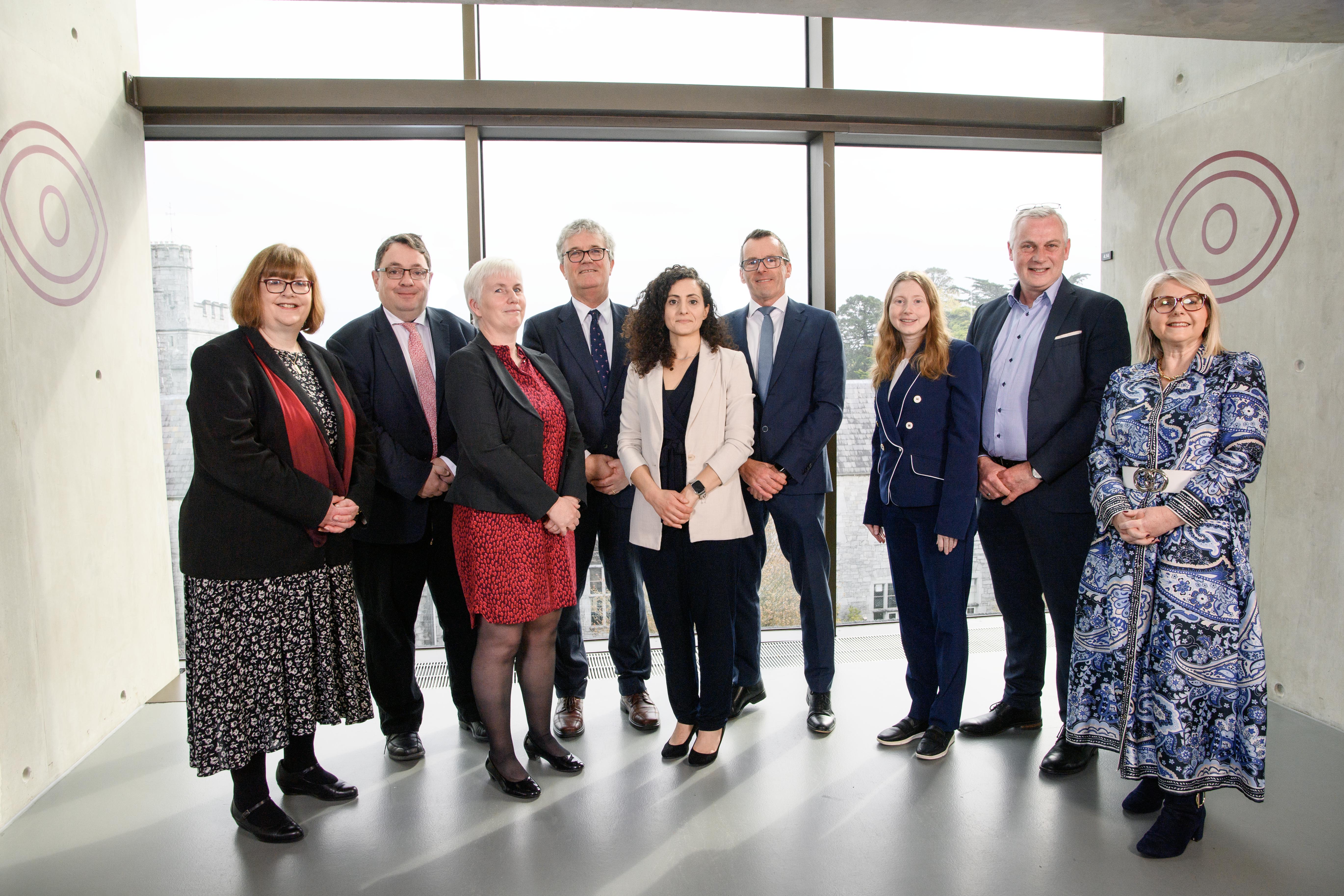NIBRT and UCC collaborate to improve Advanced Therapeutics and Vaccine Development in Ireland

Initiative marked by new joint appointment of Prof. Anne Moore and Prof. Elena Matsa
NIBRT (National Institute for Bioprocessing Research and Training) and UCC have announced a strategic collaboration as part of the Future Pharmaceuticals initiative with the joint appointment of Professor Anne Moore, and Professor Elena Matsa as Principal Investigators at NIBRT and at the School of Biochemistry and Cell Biology in UCC.
This partnership marks a significant step forward in advancing research excellence and fostering innovation in bioprocessing. It brings together formally for the first time the complementary expertise and experience within both NIBRT and UCC in research of relevance to biopharmaceuticals, and the strong track record in both institutions of collaborative engagement with the biopharmaceutical sector in Ireland and internationally.
Professor Anne Moore brings to this joint appointment a wealth of expertise in immunology, bioprocessing, and vaccine development. Professor Moore completed a PhD in HIV vaccine immunology with Professor Kingston Mills and subsequently embarked upon postdoctoral work on defects in immune responses in HIV-infected individuals in the Wistar Institute in Philadelphia and further work on recombinant vaccines against viruses such as HIV and Ebola virus in Dr. Gary Nabel’s lab, then at the University of Michigan. As a senior immunologist in Prof. Adrian Hill’s group in the University of Oxford, she developed several T-cell inducing vaccine candidates against malaria, TB and influenza and was involved in clinical trials of these and other vaccine candidates. Professor Moore has more recently focussed on developing new stable, injection-free and easy-to-administer delivery technologies to improve global equitable access to vaccines.
In her new role, Professor Moore will lead collaborative research initiatives between NIBRT and UCC, focusing on sustainable, regionalised bioprocessing technologies for vaccine production and deployment. Leveraging state-of-the-art facilities and multidisciplinary expertise in pre-clinical immunology, biopharmaceutics and bioprocessing across the two institutions, Professor Moore’s research will aim to determine how new delivery technologies improve vaccine efficacy, thereby providing better protection against disease and can be integrated into new, sustainable vaccine manufacturing systems, thereby providing improved access to vaccines.
Professor Elena Matsa was previously a postdoctoral fellow and Instructor at the Stanford Cardiovascular Institute, Stanford University School of Medicine, where she studied human induced pluripotent stem cells (iPSC) to model cardiovascular disease and cardiomyocyte-drug interactions. As an Instructor, Professor Matsa coordinated a team of postdoctoral fellows for the development and optimisation of drug screening assays in iPSC derived cardiomyocytes (iPSC-CM), managed full-time research associates, mentored graduate students, and conducted independent research experiments.
Since 2017, Professor Matsa has held several roles in industry, through which she used state-of-the-art technologies for next-generation sequencing, genome editing, high throughput automated characterisation of iPSC-derivatives such as skeletal muscle cells, neurons, macrophages and hematopoietic stem cells, and high throughput screening to advance new therapeutic products towards the clinic.
In her most recent role as Senior Vice President in Cell Therapy Research at Cellistic, Professor Matsa strengthened the leadership team providing expertise and strategic guidance on bioreactor-based iPSC specification towards immune cell types, such as T-regulatory cells (Treg), Natural Killer (NK) cells, and T-cells.
Professor Matsa has expertise and experience in a broad array of functions essential to successful allogeneic cell therapy manufacturing, and her work has been published in Cell Stem Cell, Nature Medicine, Science Translational Medicine and the European Heart Journal, among others.
Professor Matsa joins the UCC-NIBRT with the ambition to strengthen the iPSC Cell Therapy field in Ireland, and worldwide. Her research will focus on improvements in the purity, yield, and reproducibility of iPSC-based cell therapy manufacturing, in an overall plan that will bring together a cooperative research program between UCC, NIBRT, industry and academic partners as well as hospitals and patient groups.
Professor John O’Halloran, President of University College Cork, expressed his excitement about the partnership, stating:
“The joint appointment of Professor Moore and Professor Matsa represents a strategic milestone, as it establishes the first formal link between NIBRT and UCC. This collaboration brings together two distinguished experts with impressive track records in engaging with the biopharma sector and complementary expertise. With their combined knowledge and experience, we are well-positioned to drive research excellence and foster innovation in bioprocessing.”
Darrin Morrissey, NIBRT CEO, echoed Professor O’Halloran’s sentiments, emphasising the transformative potential of the collaboration.
“The joint appointments of Professors Moore and Matsa represent a significant milestone in our partnership with UCC and underscore the shared dedication of our institutions to advanced therapies and vaccines research. The ultimate impact of these appointments will be to further strengthen Ireland’s position as a world-leader in manufacture of biologic-based medicines.”
The collaboration between UCC and NIBRT exemplifies a strategic alliance aimed at harnessing complementary strengths and expertise to address complex challenges in bioprocessing and vaccine development. By combining the resources and capabilities of both institutions, the partnership seeks to both drive scientific discovery and facilitate knowledge exchange.
Rory Mullen, Head of BioPharma and Food at IDA Ireland added:
“These joint appointments will help to continue to drive Ireland’s reputation as a centre of excellence for Biopharma manufacture. The continuing growth and transformation of the Biopharma sector is driven by innovation and is a key part of IDA’s current strategy that has an enormous economic impact all over Ireland”.
